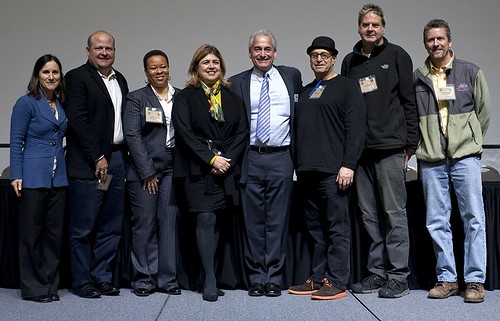
For over a century, my hometown of Chicago has been a cultural, financial, and agricultural hub. And as a hub, it has a long history of supporting innovation and opportunity. From the first cattle drives came the great Chicago Stockyards that supplied meat to the nation. From the early trading of the Chicago Butter and Egg Board came the Chicago Mercantile Exchange. The city’s richly-woven tapestry of cultural diversity and the success of its food businesses prove Chicago’s value as an ideal business cultivator.
That is why it was so fitting that AMS Deputy Administrator Arthur Neal and I were invited to present at the Good Food Festival & Conference in Chicago on March 14. Hosted by Jim Slama of FamilyFarmed.org, the event is the oldest sustainable and local food trade show in America. Each year it brings together stakeholders including farmers, entrepreneurs, policy makers, and food industry representatives.
It was inspiring to talk with such a diverse group about innovative ideas to support the production and distribution of locally grown food. My agency, the Agricultural Marketing Service (AMS) has worked on local regional food systems for many years. In fact, at AMS we like to say “We did local before local was cool.” In Chicago, we had the opportunity to celebrate the synergy of good food, great ideas, and new partnerships as we strive to increase healthy food access and economic growth in communities around the country.
I highlighted Secretary Vilsack’s ongoing support of local and regional food systems, much of which is coordinated across USDA by the Know Your Farmer, Know Your Food initiative. I also shared how the new Agriculture Act of 2014 (Farm Bill) gives AMS a key role in providing increased support for local and regional food systems. Programs like our Farmers Market Promotion Program (now the Farmers Market and Local Foods Promotion Program) and Specialty Crop Block Grant Program help turn entrepreneurial seeds into fruitful businesses and community resources.
Equally important, these creative small businesses are delivering fresh, healthy foods to underserved areas in both rural and urban communities. Through supply chain models like food hubs—which connect rural communities of suppliers (farmers and ranchers) to larger suburban and urban communities (schools, hospitals, restaurants, etc.)—more and more farmers and suppliers are coming together to meet community needs and consumer demand.
In order to support the continued development of these food hubs and the many benefits they provide to rural economies, AMS is partnering with FamilyFarmed.org to develop a national guide on “Building Successful Food Hubs.” The guide will include descriptions of key functions, best practices, and proven strategies for food hubs—all based on successful models operating across the United States.
Through this cooperative effort and others like it, along with USDA’s new and expanded efforts to support small- and mid-sized farmers and ranchers, we will continue the long Chicago tradition of turning local business success into national prosperity.



